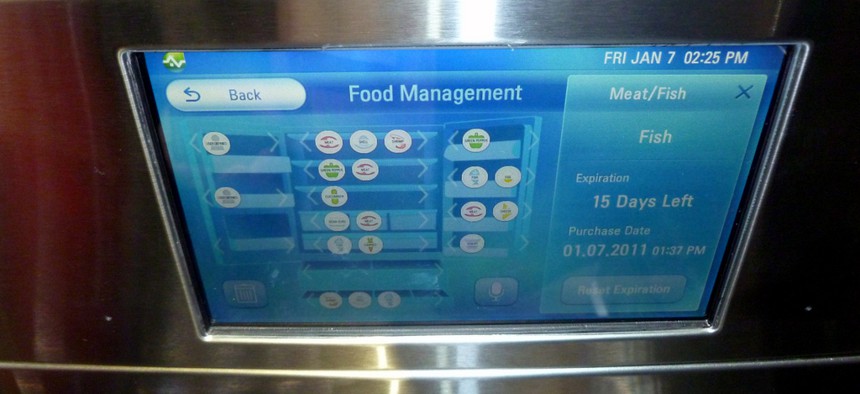Some Things Should Be Banned from the Internet of Things

The console of the LG's Smart Refrigerator has menus for "food management." Flickr user davidberkowitz
Connecting refrigerators to the Web -- what could go wrong?
The unknown danger in connecting an increasing number of analog objects, such as light bulbs, to the Web is worrying policy advisers.
The "Internet of Things” just might have too many things, says Richard Danzig, a member of the Defense Policy Board and the President’s Intelligence Advisory Board.
"Information companies are maintaining connectivity and have built-in mechanisms for patching, however inadequate -- now what we have, in the Internet of Things, are lots of companies making refrigerators" or other objects "that are not information companies,” he said. “And the effect is that we are much more vulnerable."
Danzig, a former Navy secretary, was speaking with other cyber experts about his new Center for a New American Security report on containing national security threats in an increasingly wired world.
For key systems, the paper recommends sacrificing some Internet benefits to ensure security. "Methods for pursuing this strategy include stripping down systems so they do less but have fewer vulnerabilities, integrating humans and other out-of-band (i.e., non-cyber) factors so the nation is not solely dependent on digital systems," as well as "making investments for graceful degradation,” Danzig writes.
Others in attendance agreed some industries perhaps should go on an IT diet.
Some sectors "should not be connecting up and putting all things on the Internet -- period," said Melissa Hathaway, former acting senior director for cyberspace at the National Security Council and leader of the first Obama administration's landmark 60-day security review.
That argument resonated with some Pentagon officials who are working on next-generation cyber protections.
Mike Walker, a program manager at the Defense Advanced Research Projects Agency, does not set government policies but backs the idea of giving up some of the advantages of connectivity and automation in cases where the dangers are not yet understood.
Before joining DARPA, Walker consulted with companies on security holes in their systems and recalls "having this feeling of unease when I would go on one of these assessments to the energy sector or financial sector,” he told Nextgov, after the event.
But in a society where people control their lives with the swipe of a finger, Gary McGraw, chief technology officer for software security firm Cigital, questioned the practicality of cutting back on connectivity.
"So close Pandora's Box? Put the cat back in the bag?" he said.
While uber-interconnectedness could become a consumer problem, it also might not necessarily imperil national security, Danzig said.
"When somebody's medical record can be distorted or insulin pump can be tampered with -- that is a societal problem," he said. "But from a national security perspective, does it amount to something that could subvert the will of this country to achieve its ends? My guess is no. So as a national security type, I'm a little less worried about it in civilian applications."
Earlier this month, researchers at Context Information Security detailed how anyone near a popular Wi-Fi-connected light bulb could then crack that network's password.
The experiment used LIFX LED light bulbs controlled remotely using smartphones, offering energy savings and ambiance to homeowners and retailers.
But security vulnerabilities provided "knowledge of the encryption algorithm, key, initialization vector and an understanding of the mesh network" that the researchers used to "capture the Wi-Fi details and decrypt the credentials,” a company blog post states.






